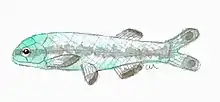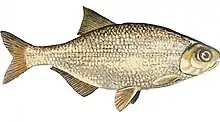| Notopteroidei | |
|---|---|
 | |
| Campylomormyrus tamandua | |
| Scientific classification | |
| Domain: | Eukaryota |
| Kingdom: | Animalia |
| Phylum: | Chordata |
| Class: | Actinopterygii |
| Order: | Osteoglossiformes |
| Suborder: | Notopteroidei Jordan, 1923 |
| Subgroups[1][2][3] | |
| |
Notopteroidei is a suborder of the order Osteoglossiformes that contains the extant families Gymnarchidae (aba), Notopteridae (feather backs and knifefish) and Mormyridae (elephantfishes), as well as several extinct taxa. The Mormyridae are weakly electric fishes, able to locate prey in turbid water.[1][2][3]
References
- 1 2 Brito, P. M.; Figueiredo, F. J.; Leal, M. E. C. (2020). "A revision of Laeliichthys ancestralis Santos, 1985 (Teleostei: Osteoglossomorpha) from the Lower Cretaceous of Brazil: Phylogenetic relationships and biogeographical implications". PLOS ONE. 15 (10): e0241009. Bibcode:2020PLoSO..1541009B. doi:10.1371/journal.pone.0241009. PMC 7595333. PMID 33119676.
- 1 2 Hilton, E. J.; Lavoué, S. (2018). "A review of the systematic biology of fossil and living bony-tongue fishes, Osteoglossomorpha (Actinopterygii: Teleostei)". Neotropical Ichthyology. 16 (3). doi:10.1590/1982-0224-20180031. S2CID 92396368.
- 1 2 Murray, A. M.; Zelenitsky, D. K.; Brinkman, D. B.; Neuman, A. G. (2018). "Two new Palaeocene osteoglossomorphs from Canada, with a reassessment of the relationships of the genus †Joffrichthys, and analysis of diversity from articulated versus microfossil material". Zoological Journal of the Linnean Society. 183 (4): 907–944. doi:10.1093/zoolinnean/zlx100.
This article is issued from Wikipedia. The text is licensed under Creative Commons - Attribution - Sharealike. Additional terms may apply for the media files.


.jpg.webp)